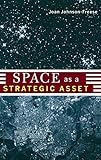Space as a Strategic Asset / Joan Johnson-Freese.
Material type: TextPublisher: New York, NY : Columbia University Press, [2007]Copyright date: ©2007Description: 1 online resource (320 p.) : 7 halftones, 2 tablesContent type:
TextPublisher: New York, NY : Columbia University Press, [2007]Copyright date: ©2007Description: 1 online resource (320 p.) : 7 halftones, 2 tablesContent type: - 9780231136549
- 9780231510011
- 358.8
- JZ5695 .J64 2007
- online - DeGruyter
- Issued also in print.
| Item type | Current library | Call number | URL | Status | Notes | Barcode | |
|---|---|---|---|---|---|---|---|
 eBook
eBook
|
Biblioteca "Angelicum" Pont. Univ. S.Tommaso d'Aquino Nuvola online | online - DeGruyter (Browse shelf(Opens below)) | Online access | Not for loan (Accesso limitato) | Accesso per gli utenti autorizzati / Access for authorized users | (dgr)9780231510011 |
Frontmatter -- Contents -- Preface -- Acknowledgments -- 1. A Clash of Ambitions -- 2. The Conundrum of Dual-Use Technology -- 3. From Apollo to Where? -- 4. The Militarization of Space -- 5. The Weaponization of Space -- 6. The Politicization of the U.S. Aerospace Industry -- 7. The Ambitions of Europe -- 8. The Ambitions of China -- 9. Avoiding a Clash of Ambitions: Toward a Comprehensive U.S. Space Strategy -- Notes -- Index
restricted access online access with authorization star
http://purl.org/coar/access_right/c_16ec
Joan Johnson-Freese argues that the race for space weapons and the U.S. quest for exclusive or at least dominant ownership of strategic space assets have alienated the very allies that the United States needs in order to maintain its leading role in space exploration. Taking a balanced look at the issues that have contributed to the decline of America's manned space program, such as lack of political support and funding, Johnson-Freese offers not only a critique but also a plan for enhancing U.S. space security through cooperation rather than competition.She begins with a brief overview of the history of international space development through four eras: before Sputnik, the space race, after Apollo, and globalization. Then she focuses on how policy changes of the mid-1990s have changed the nation, examining why the United States has grown obsessed with the development of space technology not just as a tool for globalization but as a route toward expanding an already dominant arsenal of weapons. Johnson-Freese claims that these policy choices have greatly affected the attitudes and actions of other countries, and in the fight to achieve security, the United States has instead put itself at greater peril.Johnson-Freese explains complex technical issues in clear, accessible terms and suggests a way forward that is comprehensive rather than partisan. America is not the only country with space ambitions, but it is unique in viewing space as a battlefield and the technological advancements of other nations as a dire threat. Urgent and persuasive, Space as a Strategic Asset underscores the danger of allowing our space program to languish and the crucial role of cooperation in protecting the security of our country and the world.
Issued also in print.
Mode of access: Internet via World Wide Web.
In English.
Description based on online resource; title from PDF title page (publisher's Web site, viewed 02. Mrz 2022)


